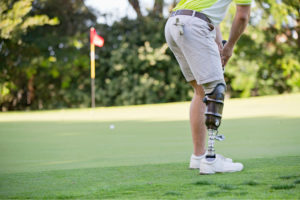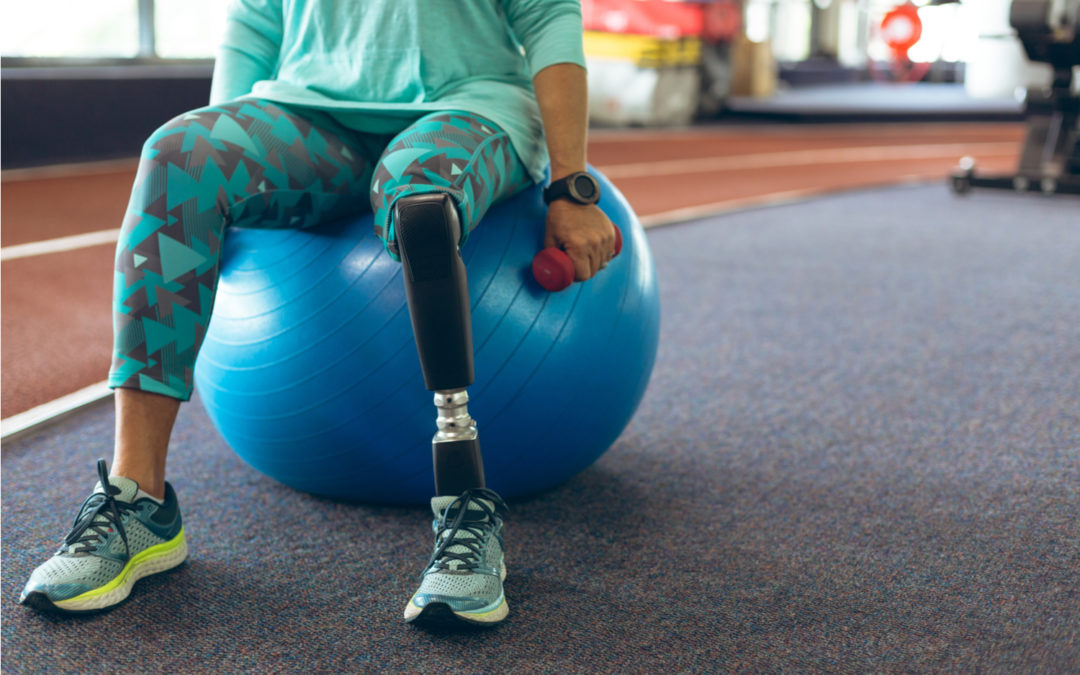Undergoing an amputation is a life changing event with mixed emotions. You’re going through a major physical change, which can affect your sense of identity and be hard on your mental health. Adapting to the physical challenges and coping with emotions like grief or frustration can take time. Throughout your recovery, you’ll have to be patient with yourself because there isn’t a map for healing. Finding support through family, friends, and more can help you throughout your transition into your new life.
Tips for Adjusting to Life as a New Employee
As you begin to adjust after an amputation, there are a few aspects of life you can expect to experience significant changes in. Immediately following your surgery, you’ll need to be ready to handle your recovery process, including managing your mental health. Once you have properly healed, it’ll be time to navigate prosthetics and daily life. The following tips are simple and practical things to remember as you adjust to life after amputation.
Physical Recovery and Healing
Once you have gone through surgery, it’s time to prioritize your physical recovery and healing to ensure you can get back to your life as soon as possible.
Following Post-Operative Care Instructions
Your doctor will provide you with post-operative instructions that you will need to follow, including how to keep your incision site clean, how to spot signs of infection, and how to properly bandage and wrap your residual limb. Each amputation will have a unique healing timeline, but you can expect to have follow-up appointments with your doctor to monitor how you are healing and adjusting.
Take Care of Yourself
Your physical health is an essential element to recovering from amputation. Make sure you get proper amounts of sleep and exercise to strengthen your body and mind. Also, make sure you eat a balanced diet to give yourself the right nutrients that your body needs to heal. You should take care of your skin by following your doctors guidelines for keeping your incision site clean to prevent infection.
What Can I Do to Help My Healing Process?
To help the amputated part of the limb heal and better prepare for an artificial limb, you should pay special attention to caring for your residual limb. Before and after amputation, your doctor will give you instructions for how to care for your limb tailored to your needs. In general, the following steps apply to most new amputees.
- Carefully and thoroughly wash amputation site to prevent infection
- Wear the shrinkers to ensure your residual limb will be the proper size
- Desensitization exercises to reduce painful sensations at the amputation site
- Dry your residual limb completely before wearing your shrinker sock
- Perform rehabilitation exercises recommended by your rehabilitation team
Phantom Limb Pain
A common issue for amputees is phantom limb pain, where you feel pain, burning, tingling, or other discomfort in the limb that has been amputated. Phantom limb pain happens because your brain and nervous system still believe the limb is there, and both systems are trying to understand the change in your sensory map. When you are dealing with emotions and stress, it can cause phantom limb pain to become more intense.
If you experience phantom limb pain, talk to your doctor about treatment options. They may recommend massage therapy, medications, or physical therapy. You could also go through desensitization techniques, such as mirror therapy or tactile stimulation. If you experience severe pain that is not improving through other treatment methods, talk to your doctor as there may be another reason for your pain.
Do Your Research
There is a plethora of information available online for how to take care of yourself, your prosthesis, and your residual limb. Ask your doctor and your rehabilitation team for advice and practical care steps, especially if you find something online that you aren’t sure about.
Mental and Emotional Well-being
Following your amputation, you may notice your mental health and emotions are struggling to handle the change to your body. It is very common for amputees to experience frustration, grief, anxiety, and depression as a result of the loss of a limb, especially if it is due to a traumatic incident.
As you start your recovery process, you should think about small, achievable goals instead of only focusing on how much farther you have in your recovery. By taking it step by step, you can make it easier to cultivate a positive mindset. If you are struggling with your mental health following your amputation, talk to your doctor about what therapy options are available to you. You can also look for support groups in your area or online.
Focus on Developing Your Mindset
Believing you can reach your goals and overcome your challenges and then acting on that belief is just as important as physical therapy. Focus on adapting and learning, while still moving through the stages of grief from losing a limb.
Be Patient With Yourself
Losing a limb can be a traumatic experience. Even if your amputation was not due to an injury or accident, it is a big life change. Adapting to changes like this takes time. Be patient with yourself, because there will be ups and downs.
Set Boundaries for Yourself
Many people, even strangers, may want to approach you and talk about your amputation. But, because limb loss is a weighty and personal experience, you do not have to talk about it with everyone who approaches you. Learn to set boundaries around what you are and are not comfortable talking about. And if some days you feel up to it and sometimes you don’t that’s fine too.
Let People Know If It’s Ok to Ask
You will find after amputation, that some people will stare, take furtive glances, or whisper behind your back. When people respond to you this way, it can be very rude, but really they may not know what to say. If someone approaches you, they may be nervous or want to ask some common questions, but they probably won’t know how to ask.
One way you might smooth out these situations is to teach the other person to ask if it’s ok for them to ask you. That will give you the liberty to say yes or no, or say “I’m not feeling up to talking about my amputation today.” You might also thank them for respecting your feelings and boundaries.
Prosthetic Use and Mobility
 Although you may be eager to get a prosthetic and get moving, there are a number of factors that can affect how long it will take to get your prosthetic. First, your residual limb has to fully heal and the swelling has to completely go down. You may be given a temporary prosthesis around two to three weeks after surgery, but this doesn’t happen in all cases.
Although you may be eager to get a prosthetic and get moving, there are a number of factors that can affect how long it will take to get your prosthetic. First, your residual limb has to fully heal and the swelling has to completely go down. You may be given a temporary prosthesis around two to three weeks after surgery, but this doesn’t happen in all cases.
Once your residual limb has healed, you’ll start fittings for your prosthetic around 2-6 months after your surgery. Your prosthetist will work with you to find the right prosthetic device for your needs and ensure the best fit. After you have your prosthetic, you will need to continue your physical therapy to get used to your prosthesis.
Take Care of Your Skin
You will need to take extra care of the skin around the amputation site, especially after the initial procedure. Cleaning, drying, and properly moisturizing your skin will help it heal properly and help your prosthesis fit more comfortably.
Bonus tip: never use baby powder on the skin that fits into the prosthesis socket. The powder will ball up and will irritate your skin.
Daily Life Adaptations
Depending on the limb you have amputated, there are different home modification and adaptive tools you can use to make daily activities more accessible. Ramps, grab bars, dressing aids, driving adjustments, and more can help you get back to regular activities.
Try New Hobbies
As you get back into your daily life, it could be a great opportunity to try something new. Big life changes get easier when you find a way to spend your time that is meaningful to you. It might be a sport like biking or swimming, or it could be something artistic like painting or music. Give yourself a creative outlet to help you regulate and process your feelings.
Remember “Amputee” is Not an Identity
Perhaps the most difficult part of navigating a major life event like losing a limb is the challenge of defining your identity or choosing how you see yourself. Instead of identifying as an amputee, consider it as an identifier. It does not define who you are, but it is an aspect of your life that you are experiencing.
What you do and who you choose to be after amputation and prosthesis is up to you. There will be challenges, but even then you are who you choose to be.
New Amputees FAQs
Losing a limb to amputation is a major life change, and many people who experience limb loss have similar questions. Below are a few frequently asked questions, followed by several tips for new amputees. We hope this article inspires, comforts, and helps you prepare for and adapt to post-amputation life.
How Long Does It Take to Recover From an Amputation?
Following an amputation, you can expect to be in recovery from several months to a year. Your recovery process will include giving your wound time to heal, physical therapy, and any other supportive measures you need to adapt to your new daily life.
How Do I Care for My Residual Limb?
Make sure to keep your residual limb clean and dry, and clean your prosthesis regularly. You should also change any socks you use with your prosthesis regularly to prevent moisture buildup. Antiperspirants can also help reduce excessive sweating. If your residual limb starts to dry out, you can use a moisturizer to help hydrate the area, but you should not apply it before putting on your prosthetic.
What Does Phantom Limb Pain Feel Like?
Amputees describe phantom pain as pain or discomfort coming from the limb or body part that is no longer there. The sensations associated with phantom pain include:
- Burning
- Cramping
- Crushing
- Pins-and-needles
- Numbness
- Shooting
- Stabbing
- Throbbing
- Tingling
What Can I Do About Phantom Limb Pain?
Currently, there is no one specific treatment for phantom pain, but there are ways you can manage your symptoms. In terms of medications, your doctor may prescribe over-the-counter pain relievers such as ibuprofen, naproxen sodium, and acetaminophen can help reduce phantom pain.
Your doctor may also prescribe antidepressants, anticonvulsants (seizure medication), or narcotics. For any and all medications, you should communicate closely with your doctor to make sure it is working for you and to avoid side effects or overdoses.
Your doctor may also recommend noninvasive therapies such as brain stimulation surgery, acupuncture, spinal cord stimulation, or repetitive transcranial magnetic stimulation (rTMS).
Why Do I Have to Wait for Prosthesis After Amputation?
After amputation, your residual limb will need time to heal before you can be fitted with a prosthetic. After the amputation, the incision will be closed with surgical sutures or staples and dressed. You will also be required to wear a special compression bandage called a shrinker, to decrease the swelling and size of the amputated limb at the amputation site.
Because amputations and residual limbs vary from person to person, it takes time to craft and fit custom prosthetics to new amputees. And in order to properly fit the prosthesis, your residual limb should be stable.
How Long Will a Prosthetic Last?
The functional time of prosthetic limbs depends on several factors. For instance, younger amputees who lead an active lifestyle tend to wear out their prosthetic limbs faster than amputees with less active lifestyles.
For new amputees, you will go through an adjustment period with your first prosthesis. Your residual limb may swell or shrink in the first few months. As your residual limb changes, your prosthetist can change out the socket and liners. However, if the residual limb changes dramatically, you may need a new prosthetic limb.
What is the Process for Getting My Prosthesis?
First, when you visit your doctor or surgeon, we will evaluate your needs and your overall health to determine if amputation and prosthesis is right for you. After your amputation, we will cast a mold of your residual limb, then send the mold to our lab to prepare the first socket.
Once the socket is made, we will perform a diagnostic test to make sure the socket fits properly, we will then make any final adjustments and finish building your prosthetic. Finally, once your prosthesis is finished, it will be ready for you to pick it up.
How Can I Pay for Prosthesis?
The costs of a new prosthetic limb are high, and the more of a limb that needs to be replaced, the more the prosthesis will cost. Thankfully, several insurance plans provide coverage for at least a first prosthesis. When considering prostheses in Tennessee, you should carefully review your insurance policy so you know exactly how much your plan will cover.
Will I be Able to Return to my Normal Activities?
Yes, you can return to normal activities after amputation with proper physical and occupational therapy.
Can I Have an Active Lifestyle As an Amputee?
Yes, in fact, many amputees find outdoor hobbies, adventures, and activities to be fulfilling and meaningful.
Can I Still Drive as an Amputee?
Amputees are not limited from driving. Depending on the type of amputation, it may be more difficult at first, but with proper training and support, it will become easier.
What Support is There for New Amputees?
First of all, your support starts with our professional team of surgeons and certified prosthetic assistants at The Surgical Clinic. We will help you in every aspect of your prosthetics care.
In terms of medical support, seeking help from physical therapists, occupational therapists, and mental health professionals can help you strengthen your body and mind after amputation.
Family and close friends can also be a source of support, and they also might not be the right people to lean on.
The online community of amputees on YouTube, Reddit, Instagram, and Facebook are good places to find resources and advice from other amputees. You may even make some new friends through these social media platforms.
We can also help you find a support group for amputees in Nashville, so you can better work through the grieving process and deal with the emotions that come with losing a limb.

State of the Art Tennessee Prosthetics and Prosthetists at The Surgical Clinic
If you are a new amputee, need a new prosthetic, or may have to receive an amputation, visit our expert team of prosthetists at The Surgical Clinic in Nashville, TN. We are committed to providing the highest quality care and support tailored specifically to your needs and goals. Our staff will provide you with the resources, training, and support you need to successfully adapt to your life after amputation.
Related Articles
- MANAGING PAIN AFTER AMPUTATION SURGERY
- PREPARING YOUR RESIDUAL LIMB FOR A PROSTHESIS
- AFTER LEG AMPUTATION: KEEPING YOUR OTHER LEG HEALTHY
Visit The New TSC Prosthetics Center
410 42nd Ave N | Suite 207
Nashville, TN 37209

